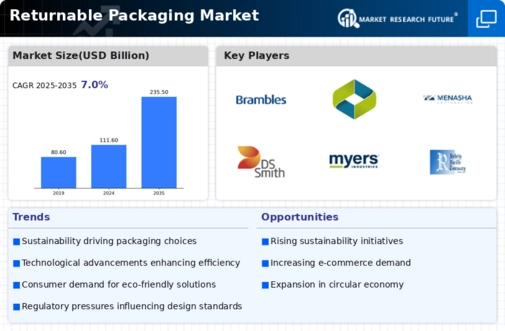Top Industry Leaders in the Returnable Packaging Market
 The returnable packaging market is experiencing a surge, driven by environmental concerns, rising waste management costs, and evolving consumer preferences. This dynamic space is teeming with competition, with established players and innovative startups vying for market share. Let's delve into this landscape, exploring strategies, key players, industry trends, and recent developments.
The returnable packaging market is experiencing a surge, driven by environmental concerns, rising waste management costs, and evolving consumer preferences. This dynamic space is teeming with competition, with established players and innovative startups vying for market share. Let's delve into this landscape, exploring strategies, key players, industry trends, and recent developments.
Competitive Strategies:
In this dynamic market, companies are adopting various strategies to gain an edge:
-
Innovation: Developing eco-friendly materials, smart packaging solutions with tracking capabilities, and optimizing designs for reusability are key areas of focus. -
Expansion: Leading players are expanding geographically and into new end-use industries. -
Partnerships: Collaborations with logistics providers and retailers are enabling efficient collection and return systems. -
Technology: Integrating blockchain for transparency and traceability is gaining momentum. -
Subscription Models: Offering packaging-as-a-service models is gaining traction, providing convenience and cost-efficiency for customers.
Key Players and Market Share:
The market landscape features a mix of established players and innovative startups. Some major players include:
-
Reusable Transport Packaging (RTP) companies: CHEP, Brambles, Tosca -
Plastic crate and container manufacturers: Schoeller Allibert, Pacpal, Rehrig Pacific -
Metal and wooden pallet manufacturers: IPP, TIMCO, Rose Pallet -
Logistics and recycling service providers: DHL, FedEx, UPS
Market share is influenced by factors like:
-
Product portfolio and innovation: Offering diverse and sustainable solutions is crucial. -
Geographic reach and presence: Servicing key regions and industries drives growth. -
Customer service and support: Efficient reverse logistics and after-sales service matter. -
Cost competitiveness: Balancing affordability with sustainability is essential.
Key Companies in the Returnable Packaging market include
- Brambles (Australia)
- Schoeller Allibert (Netherlands)
- Menasha Corporation (US)
- DS Smith (UK)
- Myers Industries (US)
- Nefab Group (Sweden)
- Rehrig Pacific Company (US)
- IPL Plastics (Ireland)
- Schutz GmbH & Co. KGaA (Germany)
- Vetropack Holding (Switzerland)
Recent News
Glow Recipe released a refillable version of its Watermelon Glow Pink Juice Oil-Free Moisturizer in February 2024, according to reports. The brand-new packaging is made of 95% recycled plastic from post-consumer sources, which implies that approximately 59% less carbon dioxide is emitted during the production process and saves about 51% more water than single-use alternatives do.
Brambles declared the purchase of Loadhog Ltd on February ’23, as stated by Brambles themselves: “We have acquired Loadhog”. This move will enable it to broaden its range of products and enter into new markets such as APAC, where it currently has a very limited presence beyond certain areas. The global returnable packaging market is expected to grow significantly after this acquisition.
‘’We have completed our acquisition of Nefab’’ said DS Smith in March’23 when they bought NEFAB AB; now that DS Smith owns Europe’s largest provider of returnable plastic packaging systems, among other things like strengthening its position within the industry through having wider product offerings so as cater for different types customers across various sectors more efficiently.
Crown Holding’s metals packaging sector saw one of its biggest ever recorded deals take place with RPC Group plc in April 2023, which is known as being the number one supplier when it comes to reusable plastic containers. With involvement in this transaction, not only does Crown Holding diversify its product line but also enters a higher margin returnable packages market compared to single-use cans.
For instance, Brambles merged CHEP China and LOSCAM China into one company in April 2023. The new firm will offer supply chain pooling solutions for returnable packaging with an efficient supply chain response to meet the increased demand for such services.
October 2023: Technological advancements emerged, with companies developing smart returnable packaging solutions. These integrated sensors to track location and condition, streamlining logistics and reducing waste
November 2023: Consumer awareness regarding sustainability increased, leading to a growing demand for eco-friendly packaging options. This trend positively impacted the returnable packaging market
By Schoeller-Allibert, in 2021, they have developed a pallet box made from recycled fishing nets. Now, this is a stronger statement about their sustainability drive. The firm is also involved in an initiative that seeks to realize sustainable long-term development for its products and packaging with a tagline of “Creating Plastic Packaging Too Good to Be Wasted.”










